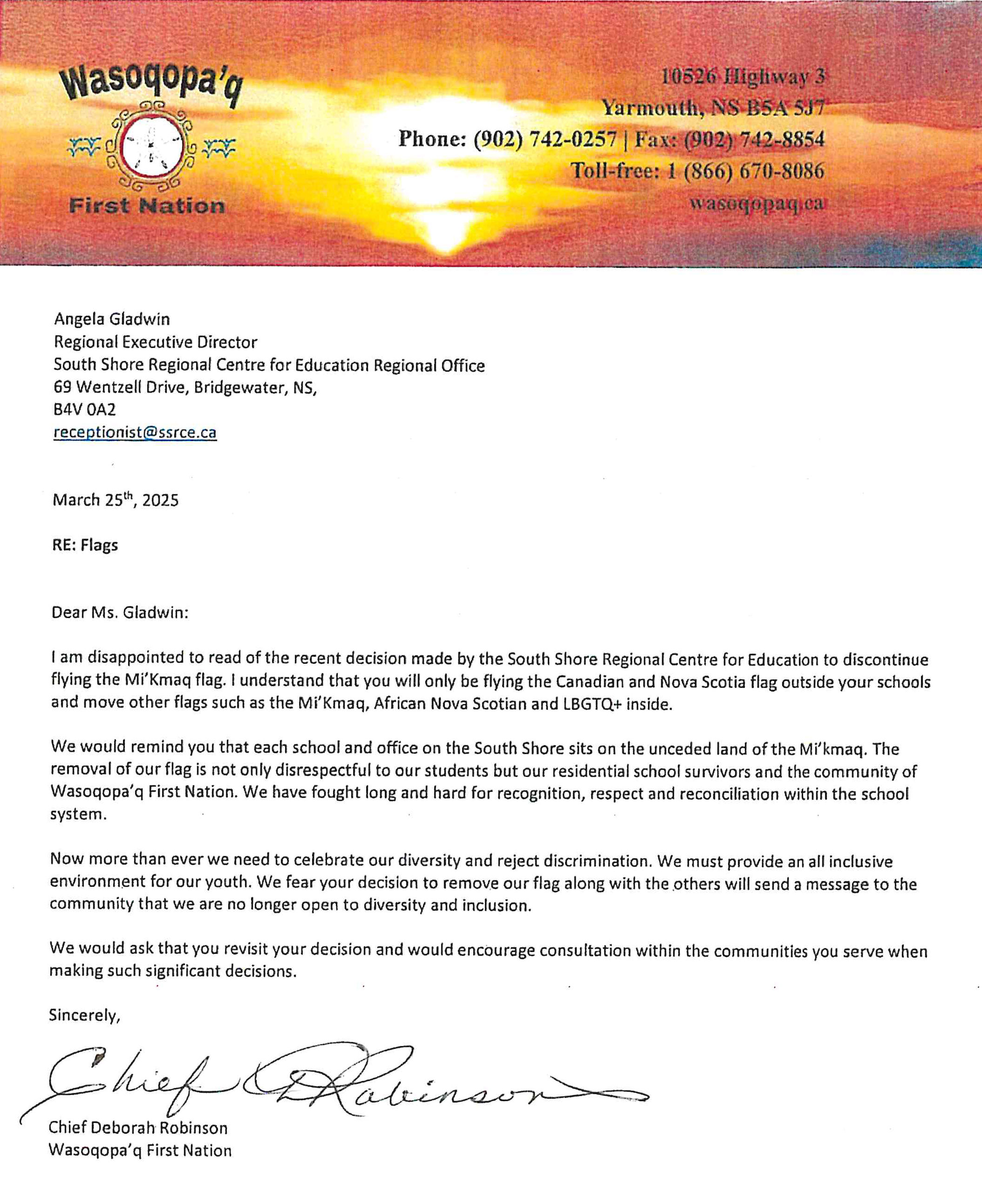News
WFN Student Awards (Yarmouth)
- Published: May 12 2025 10:48

Victoria Ogden - Ban Letter (April 16, 2025)
- Published: April 24 2025 14:31
BRUCE CLARKE LAW SERVICES COMPANY LIMITED
Victoria Ogden
*Address Unknown*
Ms. Ogden:
RE: Ban from Wasoqopa'q (Acadia) First Nation Reserves
We are the solicitors for the Wasoqopa'q First Nation. You have been attending at the Yarmouth reserve, without the consent, authorization or approval of Chief and Council of the First Nation. Your attendance has been a disturbance to residents of the reserve.
Chief and Council has reviewed the information and has issued a Ban Order, effective immediately and of indefinite duration, preventing you from entering onto any of its reserve lands or other lands under its jurisdiction or control.
The Indian Act and the First Nation Residency By-Law allow Chief and Council to control who has the right to enter onto its lands, including controlling access by non-Band Members. The Disorderly Conduct and Nuisances Bylaw gives Chief and Council the power to ban individuals, including for certain behaviours.
As a result of this Ban Order, you are not permitted to enter any Wasoqopa'q First Nation reserve or other lands owned or controlled by it, and are banned from access to any residences, stores, businesses or other facilities located on any such reserve, even if invited by a Band Member.
If you enter onto any of these Wasoqopa'q First Nation lands while under this Ban Order, you will be a trespasser and subject to punishment for an offence under Section 30 of the Indian Act, as well as subject to the laying of an information by the Attorney General of Canada under section 31 of the Act.
This Ban Order is of indefinite duration and can only be reversed by a future decision in writing from the Chief and Council. Govern yourself accordingly.
Regards,
D. Bruce Clarke, KC
Wasoqopa’q First Nation | Pre-Election Notice 2025
- Published: March 31 2025 09:00
NOTICE is hereby given that the Wasoqopa'q First Nation Chief and Council election will be held on June 14. 2025.
EIGHT Councillor positions and ONE position for Chief are available.
The nomination meeting for the 2025 election will be held at the Best Western PLUS Liverpool Hotel and Conference Centre, 63 Queen Place Dr. Liverpool, Nova Scotia, on Tuesday, the 6th day of May 2025, at 6:00 p.m., for the purpose of nominating candidates for positions on the Band Council of the Wasoqapa'q First Nation for the next ensuing term.
Any Elector wishing to participate must either (a) show their Band card or (b) state their Band number and provide Government issued photo identification (passport, provincial driver's license or Firearms Possession and Acquisition License).
Any Elector nominated will be required to provide a criminal record check (done within 6 months prior to the Election Date) by email only, to the solicitor for the First Nation, on or before May 16, 2025. Bruce Clarke's email address is .
The Election Bylaws provide for an advance poll to be conducted for Electors who otherwise cannot vote on the day of the election. An advance poll will be conducted under the direction of the Electoral Officer on Friday May 30th, 2025, at the following times and locations:
a. Yarmouth Band office from 9:30 a.m. to 11:00 a.m.
b. Best Western PLUS Liverpool Hotel and Conference Centre, 63 Queen's Place Drive, from 1:00 p.m. to 2:30 p.m.
c. Hammonds Plains Band office, Halifax from 4:30 p.m. to 6:00 p.m.
DATED, this 17th day of March 2025.
RESOURCE DOWNLOADS:
A Letter to the SSRCE | Chief Deborah Robinson
- Published: March 26 2025 08:15

Job Opportunity | Cook | Winner's One Stop Restaurant
- Published: March 17 2025 13:23
Employment Opportunity
Cook
| Position Title: | Cook |
| Department: | Business Operations – Winner’s One Stop Restaurant |
| Salary: | $17.70 per hour |
| Term: | Part-time/shift work required |
| Location: | Winner’s One Stop Restaurant, 10574 Highway #3 Yarmouth NS |
| Estimated Start Date | March 2025 |
Wasoqopa’q First Nation (formerly Acadia First Nation) is governed as a custom band under the provisions of the Indian Act with established bylaws, policies and procedures. The First Nation's electoral system constitutes an election once every five (5) years with positions for one Chief and eight (8) councillors. Chief and Council elect, are the governing body responsible for making decisions for the overall health and well-being of communities, Elders, youth and families.
Wasoqopa’q First Nation is unique in its geographical composition, spread throughout the Southwestern regions of Nova Scotia spanning five counties from Yarmouth to Halifax, encompassing six (6) reserves - Yarmouth, Ponhook, Medway, Wildcat, Gold River, and Hammonds Plains, in both rural and urban settings. To support administration and business operations, Wasoqopa’q First Nation, with supporting staff, provides programs and services within two (2) Health Centres, a Youth Centre, two (2) Community Centres, six (6) administration offices, and six (6) business establishments, including economic development, education, employment, fishing, forestry, health, housing & maintenance, human resources, and social.
Wasoqopa’q First Nation owns and operates the Winner’s One Stop Restaurant located in Yarmouth, NS. The restaurant is an upscale licensed sit-down restaurant with indoor and outdoor seating, a take-out menu, with gluten free, vegetarian and vegan options, also servicing the Tru Hilton Hotel with room service and catering.
POSITION OVERVIEW AND OBJECTIVE
WFN is currently recruiting for part-time cooks that are responsible for working as part of a team, in a fast-paced work environment to prepare quality food in accordance with the menu, to customers, with strict adherence to all health and safety regulations.
ESSENTIAL FUNCTIONS AND DUTIES
- Follows health, safety, and sanitation guidelines for the preparation and service of all menu items, specials and related products
- Establishes daily cook stations (hot and or cold side) and stocks them with the necessary supplies to prepare menu for service
- Prepares a variety of foods, grilling, frying, chopping, sautéing, broiling meat, seafood, poultry, vegetables, sauces and cold food items to standardized recipes
- Takes inventory counts before and after shifts, completing daily and weekly food inventory or storage sheets
- Estimates expected food consumption, based on demand and inventory counts to determine the requisition of supplies; may place orders for inventory
- Maintains the work area throughout the shift, keeping preparation and service areas clean and sanitized in observance of safe, sanitary food handling practices
- Adhere to all cost control guidelines that have been established, monitoring stock and utilizing products prior to expiration date to minimize waste
- Ensures the highest standards to ensure consistency in food quality and speed of quality service
- Establishes and maintains well stocked inventory of Your Winner’s World C-Store, preparing and packaging products for sale
- Keeps equipment operating by following operating instructions. troubleshooting breakdowns, maintaining supplies, performing preventative maintenance, calling for repairs
- Maintains daily temperature logs, checking freezers, refrigerators, or heating equipment (and record in log) to ensure proper functioning
- Creates signage for daily specials and or special occasions and events
- Prepares orders for catering services
- Adhere to all Wasoqopa’q First Nation (WFN) Policies, Procedures and Restaurant procedures
- Working in a team environment, there may be other duties, training and activities related to the position, as required
QUALIFICATIONS
- Culinary arts diploma and or culinary skills certification from a recognized educational institution
- Previous work experience in hospitality and or catering sector
- Food Hygiene or Food Handlers Certification
- WHMIS Certification is an asset
- First Aid & CPR Certification is an asset
- Occupational Health & Safety Certification is an asset
- Criminal record check required upon hiring
REQUIRED ABILITIES, SKILLS AND COMPETENCIES
- Detail oriented and highly observant
- Excellent oral and written communication skills
- Good organizational and time management skills
- Ability to manage a fast paced, highly stressful work environment
- Demonstrated time management and organizational capabilities
- A commitment to fostering, cultivating and preserving a culture of diversity, equity and inclusion
WORKING CONDITIONS
- Hours of work are expected to occur during regular Restaurant hours of 8:00am to 8:00pm, seven (7) days a week (Shifts will be provided within this timeline)
- There may be a requirement for working any shift including mornings, evenings, weekends, and certain holidays
- There are instances of lifting heavy boxes at least up to 50 lb
- Standing for an extended period of time
- A great deal of time is spent working indoors in well maintained, heated/ventilated environment with modern and up-to-date equipment
APPLICATION REQUIREMENTS
Submit Cover Letter and Resume to **Please quote WOSCOOK# on your cover letter and indicate your salary expectations for this position.
WFN appreciates the interest of all applicants, only those selected for an interview will be contacted. WFN does not assume candidate expenses related to this recruitment process.
In accordance with the Aboriginal Employment Preference Policy of the Canadian Human Rights Commission, if all qualifications are equal, preference will be given to persons of Aboriginal ancestry and if a Wasoqopa’q First Nation Band member.
Deadline to Apply: Open Until Filled
Wasoqopa’q First Nation is committed to fostering a safe workplace that provides an equitable, diverse and inclusive environment, where employees are treated professionally and with dignity and respect. We value the contributions that each person brings, and are committed to ensuring equal opportunity and participation as part of the WFN team.
We are a community. We make a difference.
*Income Tax Returns Form - Band Members
- Published: February 20 2025 10:26
Any Wasoqopa'q First Nation Band Member wishing to file their income tax return please bring your paperwork to the nearest Wasoqopa'q First Nation Office
(This service will be provided to Members free of charge.)
